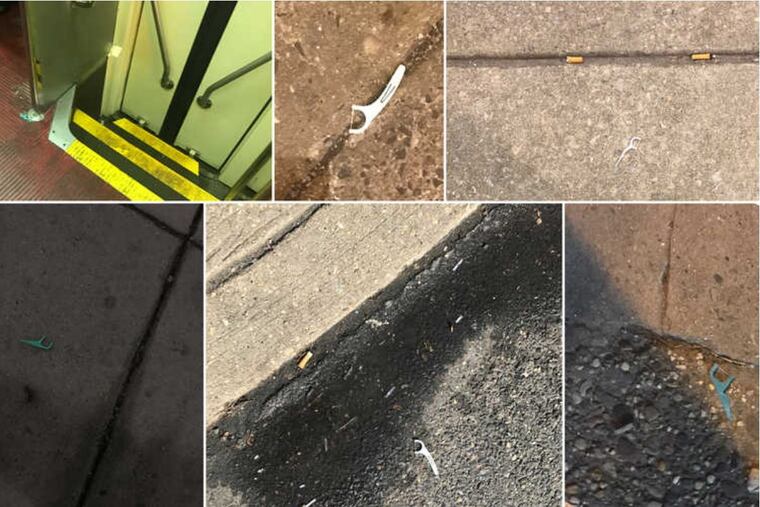A prayer for the city: Please stop flossing in public
I started compiling photographs of forgotten flossers a few weeks ago, and they were everywhere - each one the leftover evidence of a private struggle between a Philadelphian and the last fibers of his cheesesteak that I would rather not contemplate.

Philadelphia, established in 1682, is a city scattered with hundreds of historical markers. You know what we don't need on top of all that? Your plaque.
What I'm talking about here is an inconvenient (not to mention, an icky) truth. It's awkward to bring up, because it's awfully personal – intimate even. But what on God's green earth is up with the dental flossers?
If you haven't noticed them, pay attention the next time you're walking down a city street. They have lately become a far-too-familiar feature in Philadelphia's public spaces, scattered among the cigarette butts and blackened knots of chewing gum. These little plastic implements – spear on one end, archer's bow on the other – are tiny bundles of yuck discarded on the floors of buses and trolleys, on subway platforms and tracks, on street corners and sidewalks.
I am not the only one to take note of the evolving litterscape of Filthadelphia. Websites have been devoted to broken, abandoned umbrellas and free-ranging hair extensions known as tumbleweaves. Local artist Andrew Jeffrey Wright for years kept a blog called "That's not a trash can. Now it is!" documenting garbage wedged into newspaper honor boxes, bushes, payphones and shopping carts. (On Instagram, the hashtag lives on.) But I would submit that the floss-and-toss is even more viscerally offensive than all of those. It's the leftover evidence of a private struggle between a Philadelphian and the last fibers of his cheesesteak that I would rather not contemplate.
Just what's so awful about them crystallized for me when I spoke with Lizzie Post, who is cohost of the "Awesome Etiquette" podcast, co-president of the Emily Post Institute, and granddaughter of that pinnacle of politeness, Emily Post.
"My grandmother used to say, 'If it requires a mirror, it requires a bathroom,' " Lizzie Post said.
But the rationale behind this pro tip cuts straight to the point.
"Most people, the reason they don't approve of public grooming is because of the parts of your body that might get left behind: the nail clippings, the hair that falls out as you brush, the dandruff," she said. "If you've ever looked at a mirror after you've flossed, there's probably specks of mouth-matter on it. It's important to realize that it really can be gross, and someone else really doesn't want to get hit with your plaque or tartar."
As for littering with said flosser, it's a compounding offense: an act of disrespect to your neighbors, your environment, and your community.
Some may argue that restaurants have distributed wooden toothpicks for decades. Those, at least, are biodegradable — whereas there's one curvy blue flosser someone discarded near my office more than a month ago that shows no signs of deterioration.
Just how widespread is this practice? I started compiling photographic evidence of forgotten flossers a few weeks ago — and they were everywhere.
I found them in the bike lane on my ride to work, in muddy grass outside a doctor's office, and scattered like confetti across all modes of public transportation. They were in all parts of the city – North and South Philadelphia, Society Hill and Spruce Hill alike.
The "why" of it all is harder to pin down. Maybe it's a symptom of our modern on-the-go lifestyle converging with advances in oral hygiene. After all, dental floss wasn't even invented until 1815, and wasn't mass-produced until 1882. It was another century before the innovation of the flosser hit drugstores.
For that, we have to thank Harry S. Katz of West Orange, N.J., who in December 1975 successfully patented a "Method of Making a Disposable Dental Floss Toothpick." He called it the FlossPick. At the time, it didn't exactly set the world on fire.
Katz made some prototypes of his own, and for a couple of years in the early 1980s, a company licensed his creation for about $400 a month. Then, in 1984, Katz lost the contract; he learned someone else had patented a nearly identical design. Uncertain of his legal standing, he didn't bother hiring a patent lawyer to prove he was the actual inventor.
"Since this invention was a simple disposable plastic product, I did not think there was likely to be a great potential for high sales," he wrote in his self-published 2013 book, A Material Scientist's Memoir.
"Looking back, this is probably one of the worst mistakes I have made in my life."
Katz, now 94, is in assisted living and struggles with short-term memory challenges. His son, Eliot Katz, said his father doesn't get out much and so is likely unaware that flossers are so often left behind.
One person who has mixed feelings about is Adrian Cummins, an associate at Society Hill Dental.
"I do see them everywhere, which is kind of gross," he said. "On the other hand, it is kind of encouraging. Whatever gets people flossing, we're happy about."
He noted that brushing cleans at most only 40 percent of your tooth.
"Flossing keeps the gums healthy, which keeps the bones healthy — which keeps our teeth in our mouth," he said. Regular dental floss is the gold standard because you can maneuver it in all directions around your teeth, while the less-flexible flosser really just goes up and down. But, he said, it's better than not flossing at all.
Still, even Cummins draws the line somewhere.
"The littering I can't support no matter what — even if you are flossing."